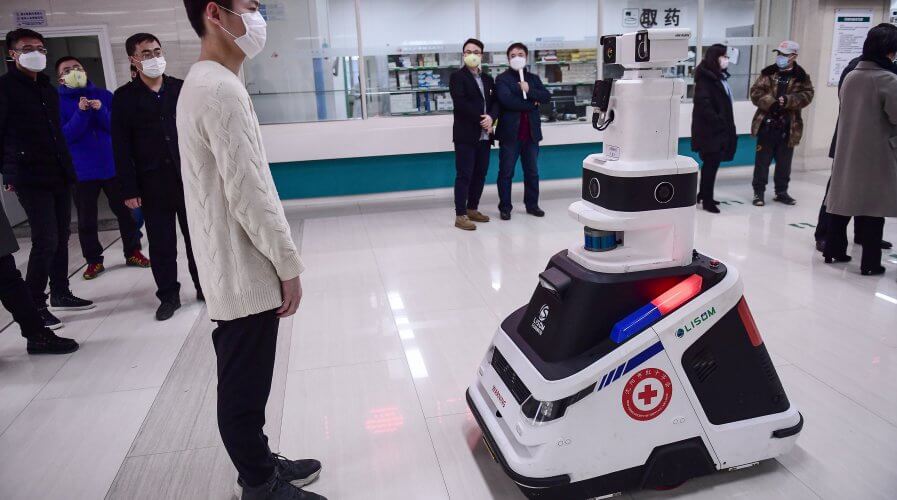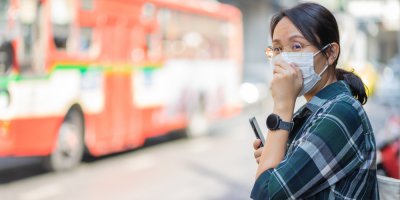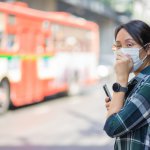
A patrol robot used to check temperatures, identities and disinfect people in Shenyang in China. Source: AFP
The tech leading Asia’s fight against the coronavirus
From robots and drones, to citizen location data and “digital detectives” – governments and organizations are leaving no stone unturned when it comes to employing tech to turn the tide of the pandemic.
If anything, the crisis is bringing out the best of the tech industry. Tech Wire Asia has reported how Asia’s cloud giants are contributing their massive computing processing power to help researchers, AI is helping scientists comb through the findings of thousands of coronavirus research papers, while in Taiwan, citizens’ smartphone data is enabling authorities to enforce quarantine measures.
Here are just some of the unique and innovative ways countries across Asia are turning to technology to help combat COVID-19.
Robots
The Chinese city of Wuhan, the original epicenter of the outbreak, has leveraged robots in the hopes to minimize contact with patients who seek COVID-19 testing.
The technology is essentially a mobile CT imaging vehicle that can perform full-body CT scans, has an intelligent imaging cloud system and can communicate with relevant information systems via 5G capabilities.
Provisioned by Ping An Health Inspection Center, the robot is able to perform medical checkups for patients outside the hospital.
Elsewhere in the world, robots are being put to use to sanitize hospitals and clinics. Robots and automated machines with the ability to kill microbes and other biological organisms using ultraviolet light have seen an exponential surge in demand since the crisis began.
Contact-tracing app
Singapore has launched a ‘contact-tracing’ app, which helps to track who those confirmed to be infected by COVID-19 have come into contact with for at least 30 minutes, within 2 meters.
The app, coined TraceTogether, will help authorities notify those that might have been infected and to ensure quarantine orders, as well as medical testing, can be done at the earliest onset.
“When requested by the Ministry of Health (MOH), users can send their TraceTogether logs to facilitate the contact tracing process,” said the country’s Smart Nation and Digital Government Office.
“Up to that point, the authorities, including MOH and Government Technology Agency, have no knowledge of the user’s TraceTogether data.”
Electronic bracelets
New arrivals to Honk Kong from overseas are being greeted by officials with electronic bracelets. The bracelets are connected to an app that arrivals have to download at the airport. The technologies sync to coordinate in sending the wearer’s location and whereabouts.
The city also requires all new arrivals to self-quarantine for two weeks as the city remains vigilant when it comes to curbing new “imported” infection cases.
Authorities will be notified if the wearers leave their homes and they would have access to their whereabouts.
Big data
In a bid to identify potentially at-risk individuals and COVID-19 carriers, South Korea has leveraged smart city infrastructure data to pin related individuals and contact them before it’s too late.
From digital payment records to CCTV, the country has been consistent in breaking the chain of infections. The efforts seem to have paid off, as infections have been gradually reduced.
Taiwan, on the other hand, has given GPS-equipped smartphones to those who have been quarantined at home.
Officials will be able to track those who are being isolated via the Line messaging app while those who are not compliant with quarantine measures will receive warning text messages from authorities and may be subjected to a fine.
READ MORE
- Are mobile payments the future? COVID-19 could see it go either way
- Will the COVID-19 pandemic be enough to break the internet?
- Now’s the time for organizations to show their humanity
- Can cloud computing sustain the remote working surge?
- COVID-19 phishing and email scams surge in Australia


